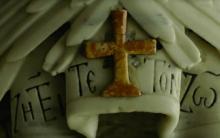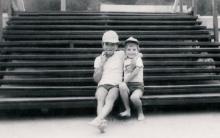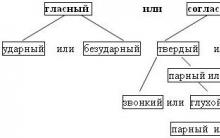Nikolai Vasilyevich Gogol is one of the most significant figures in Russian literature. It is he who is rightly called the founder of critical realism, the author who clearly described the image of the “little man” and made it central in Russian literature of that time. Subsequently, many writers used this image in their works. It is no coincidence that F. M. Dostoevsky uttered the phrase in one of his conversations: “We all came out of Gogol’s overcoat.”
History of creation
Literary critic Annenkov noted that N.V. Gogol often listened to jokes and various stories that were told in his circle. Sometimes it happened that these anecdotes and comical stories inspired the writer to create new works. This happened with “Overcoat”. According to Annenkov, Gogol once heard a joke about a poor official who was very fond of hunting. This official lived in deprivation, saving on everything just to buy himself a gun for his favorite hobby. And now, the long-awaited moment has arrived - the gun has been purchased. However, the first hunt was not successful: the gun got caught in the bushes and sank. The official was so shocked by the incident that he came down with a fever. This anecdote did not make Gogol laugh at all, but, on the contrary, gave rise to serious thoughts. According to many, it was then that the idea of writing the story “The Overcoat” arose in his head.

During Gogol's lifetime, the story did not provoke significant critical discussions and debates. This is due to the fact that at that time writers quite often offered their readers comic works about the life of poor officials. However, the significance of Gogol’s work for Russian literature was appreciated over the years. It was Gogol who developed the theme of the “little man” protesting against the laws in force in the system and pushed other writers to further explore this theme.
Description of the work
The main character of Gogol's work is the junior civil servant Bashmachkin Akaki Akakievich, who was constantly unlucky. Even in choosing a name, the official’s parents were unsuccessful; in the end, the child was named after his father.
The life of the main character is modest and unremarkable. He lives in a small rented apartment. He occupies a minor position with a meager salary. By adulthood, the official never acquired a wife, children, or friends.

Bashmachkin wears an old faded uniform and a holey overcoat. One day, severe frost forces Akaki Akakievich to take his old overcoat to a tailor for repairs. However, the tailor refuses to repair the old overcoat and says it is necessary to buy a new one.
The price of an overcoat is 80 rubles. This is a lot of money for a small employee. In order to collect the necessary amount, he denies himself even small human joys, of which there are not many in his life. After some time, the official manages to save the required amount, and the tailor finally sews the overcoat. The acquisition of an expensive item of clothing is a grandiose event in the miserable and boring life of an official.

One evening, Akaki Akakievich was caught up on the street by unknown people and his overcoat was taken away. The upset official goes with a complaint to a “significant person” in the hope of finding and punishing those responsible for his misfortune. However, the “general” does not support the junior employee, but, on the contrary, reprimands him. Bashmachkin, rejected and humiliated, was unable to cope with his grief and died.
At the end of the work, the author adds a little mysticism. After the funeral of the titular councilor, a ghost began to be noticed in the city, taking away overcoats from passers-by. A little later, this same ghost took the overcoat from that same “general” who scolded Akaki Akakievich. This served as a lesson for the important official.
Main characters

The central figure of the story is a pathetic civil servant who has been doing routine and uninteresting work all his life. His work lacks opportunities for creativity and self-realization. Monotony and monotony literally consume the titular adviser. All he does is rewrite papers that no one needs. The hero has no loved ones. He spends his free evenings at home, sometimes copying papers “for himself.” The appearance of Akaki Akakievich creates an even stronger effect; the hero becomes truly sorry. There is something insignificant in his image. The impression is strengthened by Gogol's story about the constant troubles befalling the hero (either an unfortunate name, or baptism). Gogol perfectly created the image of a “little” official who lives in terrible hardships and fights the system every day for his right to exist.
Officials (collective image of bureaucracy)

Gogol, talking about Akaki Akakievich’s colleagues, focuses on such qualities as heartlessness and callousness. The unfortunate official's colleagues mock and make fun of him in every possible way, without feeling an ounce of sympathy. The whole drama of Bashmachkin’s relationship with his colleagues is contained in the phrase he said: “Leave me alone, why are you offending me?”
"Significant person" or "general"

Gogol does not mention either the first or last name of this person. Yes, it doesn’t matter. Rank and position on the social ladder are important. After the loss of his overcoat, Bashmachkin, for the first time in his life, decides to defend his rights and goes with a complaint to the “general”. Here the “little” official is faced with a tough, soulless bureaucratic machine, the image of which is contained in the character of a “significant person”.
Analysis of the work

In the person of his main character, Gogol seems to unite all the poor and humiliated people. Bashmachkin's life is an eternal struggle for survival, poverty and monotony. Society with its laws does not give the official the right to a normal human existence and humiliates his dignity. At the same time, Akaki Akakievich himself agrees with this situation and resignedly endures hardships and difficulties.
The loss of the overcoat is a turning point in the work. It forces the “little official” to declare his rights to society for the first time. Akaki Akakievich goes with a complaint to a “significant person”, who in Gogol’s story personifies all the soullessness and impersonality of the bureaucracy. Having encountered a wall of aggression and misunderstanding on the part of a “significant person,” the poor official cannot stand it and dies.

Gogol raises the problem of the extreme significance of the rank, which took place in the society of that time. The author shows that such attachment to rank is destructive for people with very different social status. The prestigious position of a “significant person” made him indifferent and cruel. And Bashmachkin’s junior rank led to the depersonalization of a person, his humiliation.
At the end of the story, it is no coincidence that Gogol introduces a fantastic ending, in which the ghost of an unfortunate official takes off the general’s overcoat. This is some warning to important people that their inhumane actions may have consequences. The fantasy at the end of the work is explained by the fact that in the Russian reality of that time it is almost impossible to imagine a situation of retribution. Since the “little man” at that time had no rights, he could not demand attention and respect from society.
Akakiy Akakievich and the “significant person”
in the storyN.V. Gogol"Overcoat".
Fantasy in the work.
In the lesson you will reveal the meaning of the opposition between Akaki Akakievich and “meaning”body", signs of the hagiographic genre in the story, the difference between the storyand lives, and also spendindependent research work with text.
In Gogol's collected works, the phrase new overcoat was printed in different ways: sometimes in italics, sometimes in quotation marks. The Academic Complete Works adopted the form of writing the first collected works of Gogol, i.e. in quotes. It is obvious that the author emphasizes this word, puts emphasis on it, thereby denoting its special meaning. The story clearly distinguishes two periods in the hero’s life, which can be conventionally designated as the “hood period” (or rewriting) and the “new overcoat period.” The “hood period” and the “new overcoat period” are contrasted according to a number of significant characteristics.
Open your notebook and write down the date and topic of the lesson. Draw a table.

(To enlarge, left click)
« The construction of the overcoat was caused by a domestic reason - the onset ofI eat frost, at the same time the element of cold in the story is the main plotmetaphor. This is easy to see by paying attention to the duration"winter time" in "Overcoat".
Gogol indicates in detail the specific time frame for replacing the old capoand a new overcoat: “The director assigned Akakiy Akakievich... as much as sixty rubles... Another two or three months of a small government-money - and Akaki Akakievich had, for sure, about eighty rubles.” It took the tailor “only two weeks” to complete the job. SoThus, the specific period of “construction” of the overcoat is determined - sixand a half months.
All this time, the narrative space is getting colderand colder. Cold has no everyday meaning. This is one of the centralimages of the story. The “physical space” of cold in the story does not correspond towearable with calendar time. The St. Petersburg northern frost becomes a devilish temptation, which Akaki Akakievich is not able to overcome.
With the advent of the dream of an overcoat and a new overcoat in the life of Akaki Aka-Kievich everything changes. The overcoat becomes the heroine of the story, definingsharing all the twists and turns of the plot. All characters are connectedprecisely by their attitude towards the overcoat. This is emphasized by the title of the story.sti. That is why N.V. Gogol abandoned the title “The Tale of Officials”ke, stealing an overcoat,” replacing it with “Overcoat.”
Research work with text. ZComplete the right side of the table in your notebook (see table above).
The new overcoat becomes part of his existence, a friend of his life.The overcoat forces the ascetic and the recluse Akakiy Akakievich to make a number of irreparable fatal mistakes, pushing him out of his blissful statethe state of closed happiness in the anxious outside world, in the circle of officials and the night street. Akakiy Akakievich, thus, betrays himself“internal” person, preferring the “external”, vain, subjecthuman passions and vicious inclinations.
Akaki Akakievich becomes like other officials: he barelydoes not make mistakes during rewriting, changes previous practiceshabits and goes to a party, suddenly runs after an unfamiliar lady, drinks champagne, eats “vinaigrette with cold veal, pate and pastry pies."

What episode is depicted in the illustration by Yu. Ignatiev?

What emotions did the hero experience during the robbery? Is the robbery of Akaki Akakievich accidental?
This event occurs precisely when Akaki Akakievich ceases to be an “inner” person. Robbery is retribution for betrayal of one’s career.
The hero loses all his quiet meekness, commits actions out of character with his character, he demands understanding and help from the world, actively advances, achieves his goal. So, Akakiy Akakievich shouts to the watchman, “that he is sleeping and isn’t watching anything, doesn’t see how a person is being robbed,” confuses the landlady with a “terrible knock on the door,” goes to the private bailiff, threatens the clerk, lies, that he came on official business. For the only time in his life, Akakiy Akakievich misses his presence. On the advice of officials, Akakiy Akakievich goes to a “significant person.”
The image of Akaki Akakievich is closely connected with another image of the story, namely with the image of a “significant person”. To simplify somewhat, we can say that it is on the collision of these two images that “The Overcoat” is built.
Remember how the hero met with"significant person" P After Bashmachkin left, the general “felt something like regret.” The memory of him troubled him, and he even sent an official to inquire about his affairs. The news of Bashmachkin's death shocked the general. He “heard the reproaches of his conscience.” Which hero of the story experiences similar feelings when confronted with Akaki Akakievich?
In the story, the similarity of the internal states of the general and “one young man” who accidentally offended Akaki Akakievich at the beginning of the story is obvious.
The difference between Akaki Akakievich and a “significant person” is enormous at first glance, but there is a connection between them.
Fill out the right side of the table.

No matter how great the difference between Akaki Akakievich and the “significant person” is, it is not so great that the undoubted connection between them disappears. The misfortune of Akaki Akakievich also befalls the general, thereby equalizing them, two tiny figures, equal in the face of the Almighty. This idea, in particular, is served by the obvious echo of the scenes of the loss of the overcoat in Akaky Akakievich and in the “significant person”.
The unrighteous elder is the persecutor of St. Akakia, locatedhe has both obedience and subordination to the “significant person”Akakiy Akakievich is playing, and a “significant person” performs in the finale of hispersecutor. As in the Life of St. Akakiya there is an awakening of consciencean “unrighteous elder” under the influence of a conversation with the deceased novice Akaki, and a “significant person” after a meeting with a “living dead”Akaki Akakievich is changing for the better.
The life of Akaki Akakievich is not an ordinary “life”, but a “life”. Aka-kiy Akakievich - “martyr of the 14th class.” The martyr's earthly existence was surrounded by legendary details after death.
In Gogol, the death of the “little man” takes on the features of a cosmic cataclysm. The fate of Akaki Akakievich is the fate of man in general in the face of God and the universe. His main and, it seems, only talent was the ability to be content with what he had. This helps him overcome all the contradictions of life and, to some extent, becomes a manifestation of “dispassion.” With the loss of this property, Akaki Akakievich loses life itself.
His behavior before his death is completely contrary to humility. In his dying delirium, Akaki Akakievich utters angry, angry words. This is another moment of contact with “The Ladder.”
It would seem that using the example of “The Overcoat” we can say that the writer inherits the tradition of the hagiographic genre in it. However, the comparison of the text of the story and the text of the life is more complicated than a simple parallel. In the case of Akaki Akakievich, one cannot talk about holiness.
The ending of the story also sounds like a “triumph of truth”, like a depiction of Bashmachkin’s posthumous rebellion against “significant persons”, i.e. as a formidable possibility of rebellion, and not its implementation, as a struggle not of the hero, but of the author against the despotism of the powerful, as an expression and revenge and retribution of the weak. Researchers associated the meaning of the ending not only with the image of Bashmachkin, but also with the image of a “significant person.” And it often turned out that the story was written only to show the general’s repentance.
Lesson summary.
In the story of Akaki Akakievich, Gogol did not show a movement towards good,climbing the “ladder” of virtues, and the reverse movement, down theladder: from the ascetic to the “little man.”
N.V. Gogol turns in “The Overcoat” to the very process of enslavementAkaki Akakievich's passion goes with the hero along the path that leads him to fall. Movement towards good is possible only through overcoming temptation. niy evil.
“Significant persons must feel guilty for the tragicthe fate of Akaki Akakievich. That is why his image grows after deathinto a hostile, terrible and ominous symbolic figure, alarmingtheir conscience."
Homework
Write an essay on one of the topics: ““Significant person” and A.A. Bashmachkin in the storyN.V. Gogol's "The Overcoat"", ""External" and "internal" man in the imageAkakiy Akakievich Bashmachkin.”
The romantic writer, as a rule, was inclined to express a skeptical, sublimely distrustful attitude towards words. Gogol seems to echo such a romantic. However, now in Gogol the writer, the artist turns out to be powerless not before the sublime and exceptional, but before the lowly, ordinary, in the depths of which difficulties also swirl, and there lives mental pain, and the bitterness of grievances, and social sorrow. The aesthetics of the sublime is applied to the base, and at the junction of them one can clearly hear the tongue-tied babble of some Akaki Akakievich, the helpless “that...”. “I dared to trouble your Excellency because the secretaries of that... are unreliable people...” mutters the robbed Akaki Akakievich, appearing before the general, appearing to the “significant person.” How can someone else understand you? Will he understand what you live for?
Akaki Akakievich did not read Tyutchev’s poems, shortly before the misfortune that befell him, published in 1833 in the magazine “Rumor”; and he thought that another would understand his grief. The other one didn’t understand! And a significant person said: “What, what, what? Where did you get such spirit from? Where did you get these thoughts from? what kind of riot has spread among young people against their bosses and superiors!” And Akaki Akakievich trotted home, and he died with a fever, in the heat, and in his delirium he really brazenly “blasphemed, uttering the most terrible words, so that the old housewife even was baptized, having never heard anything like that from him, especially since these words directly followed the word “Your Excellency.” Here, it seems, the tongue-tied Akaki Akakievich spoke out, belatedly, only on his deathbed resolving the question: “How can the heart express itself?” And Gogol spoke with him.
Speaking about the “significant personage,” Gogol did not fail to emphasize that “many good movements were accessible to his heart, despite the fact that he very often prevented them from being discovered.”
And here, it means, the heart did not express itself. A barrier arose between a person’s soul and his words: the position of a person in power, his rank. And the general’s soul turned out to be richer than words - tongue-tied, despite the fact that they were spoken haughtily and intimidatingly. Here, too, Gogol discovered within himself a teacher and father, reproaching another father and teacher: the general “learned... in front of the mirror” to be a teacher’s formidable one; Moreover, he was also a “venerable father of the family.” Thus, in Gogol’s world, inhabited by fathers and teachers, the general has a very worthy place. And he knows about his teaching role, he rehearses it. But no matter how much the general looks at himself in the mirror, he does not know himself; and Gogol knows him better, like a true teacher.
The “little man” found himself face to face with the arbiter of his fate, the statesman. “Little Man”, in madness, in delirium, spewing out daring threats addressed to the powers that be... “Little Man” and his death, his wretched funeral... Where was it?
“The Overcoat” refracts the events of Pushkin’s romantic poem “Ruslan and Lyudmila”, and when you see this, the ending of the story, the triumph of its hero, resurrected and regaining his kidnapped life friend, his “companion”, ceases to seem like an arbitrariness of the plot, an absurdity. The narrator’s speech in the story “The Overcoat” is a two-way speech: it is also addressed to the reality about which it narrates; and to the romantic images that she transforms. And in “The Overcoat” the heroes of “Ruslan...” come to life again. But in “The Overcoat” there is also Pushkin’s “Bronze Horseman”.
In “The Overcoat” there is a direct reference to “The Bronze Horseman”: officials tell each other “the eternal anecdote about the commandant, who was told that the tail of the horse of Falconet’s monument was cut off.” The theme of the Bronze Horseman is introduced into the story and it is frankly reduced: Pushkin’s bronze hero is presented in such a way that he will not be able to gallop after a rebel official, because it is not respectable to gallop after anyone on a tailless horse. And in general, Peter I is already history. And he was a long time ago, although he supposedly came to life for one restless night:
* ... the Terrible Tsar,
* Instantly ignited with anger,
* The face quietly turned...
Gogol corrects the situations of “The Bronze Horseman,” this “Petersburg story” by Pushkin. In “The Overcoat” one finds echoes of both the tragic misfortunes of the capital described by Pushkin and the cheerful life of St. Petersburg residents. In Gogol, the victim, a poor official, in the heat, in delirium, sees robbers. True, they did not kill the official, but only took away his overcoat; but that is why the true reality of Gogol’s time exists, so that sublime crimes turn into smaller, more prosaic abominations, which, however, also lead to the death of the victims of these simple abominations. And Akaki Akakievich was dying, and in his delirium “he saw Petrovich and ordered him to make an overcoat with some kind of traps for thieves, which he constantly imagined under the bed, and he constantly called on the hostess to pull out one thief from him, even from under the blanket...”
And then - the death of the hero, “Akaky Akakievich was taken and buried.” And having named his meager things, Gogol throws out: “Who got all this, God knows...”. And Petersburg was left without Akaki Akakievich. Both in his tragedy and in his death he became equal to the giant emperor, who indirectly, but undoubtedly, was the culprit of his death. And “misfortune fell unbearably upon him, as it fell upon the kings and rulers of the world...”
The unexpected mention of the kings and rulers of the world in correlation with the events of Pushkin’s “Petersburg story” takes on a deep meaning: the king, the ruler of the world, met face to face with the “little man” there; but only now is it finally becoming clear that both kings and their subjects experience equally bad things, although given the given social structure they will never understand each other and will not get along; and in Pushkin, the tsar, the ruler, the ruler of the world is chasing around St. Petersburg after the “little man” who insulted him, and in Gogol, on the contrary, the “little man” after his death is chasing the tsar’s protege, also a ruler and ruler. There, the highest authority persecutes the poor official; here, the poor official pursues the high authority. It’s bad for the official: they poured pieces of paper on his head and mocked him.
But it doesn’t matter to the emperor either: let’s say the bronze horse’s tail was sawed off, it’s no joke! But they claim that this tail is one of the three points on which the famous monument to the emperor rests. This means that someone managed to deprive the reigning person of a foothold and put her in danger of collapse. And then - a flood, and one official dies from the elements, as from robbers. But there are no floods, just robbers wandering around the capital and killing another official. This is all a disaster for the loyal subjects, but also for the emperor. And Gogol would not have been the father of his heroes and their soulful teacher if he had not understood their troubles and had not sympathized with them, talking about their misadventures.
It is well known that “The Overcoat” was born from a real incident: a certain official, at the cost of incredible hardships, bought an expensive hunting rifle, but on the very first day of the hunt it got caught in the reeds, fell into the water, and disappeared at the bottom. His colleagues pooled together and bought the poor guy a new gun. But as Gogol pondered the story told, everything changed: the gun was replaced by an overcoat, a “significant person” appeared, the hero was overcome by illness, death came, and after it Sunday came.











Conventional graphic symbols
The problem of the presence of petroleum products in water and how to deal with it See what “PND F” is in other dictionaries
About a six-day work week With a 6-day
What is a social worker?
Root hermitage in the Kursk region: the story of a miracle Root hermitage prayer service for the sick